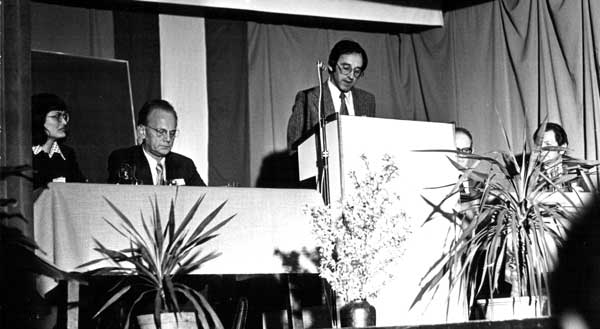In 1976, on the occasion of the 25th anniversary of Wittgenstein’s death, the “Wittgenstein Tage” (‘Wittgenstein Days’; 24-25 April) took place in Kirchberg. In retrospect, they would come to be called the “First International Wittgenstein Symposium”. It rained, and the red, white, and red Austrian flags and the blue and yellow Lower Austrian ones dripped with water. A brass band played before the local nunnery, someone sang along with it, an official gave a speech, the (first) Wittgenstein documentation in the nunnery was formally opened, from the stage of the Hotel Post’s dining room four committee members delivered papers on main aspects of Wittgenstein’s philosophy and biography.
The Second International Wittgenstein Symposium was an unexpected success, just like its proceedings volume, Wittgenstein and his Impact on Contemporary Thought, which went through two editions and has been out of print for a long time. While the ‘First’ Wittgenstein Symposium was a local affair where only four committee members delivered papers, the number of speakers rose to about 120 at the second Symposium.
Without doubt, the Wittgenstein Symposia were an enormous international success. Their general topic changed from year to year; they always offered a survey of the most recent developments in Wittgensteinian analysis and Analytic Philosophy, Philosophy of Science, and related disciplines. The most important and the most famous philosophers but also distinguished scientists (among them future Nobel prize winners) were invited to give papers. The gemütliche (‘comfortable’) inns and pubs in the village contributed in no small degree to an atmosphere of scholarly — and occasionally not so scholarly — discussion and exchange of ideas. The scene of these occasions may be described by quoting Wittgenstein: “When philosophizing you have to descend into the old chaos and feel comfortable in it.”
In principle, our goals have remained the same from the beginning until today: (1) the discussion of Wittgenstein’s philosophy, of that form of philosophy which was initiated by Wittgenstein, and, in general, of that philosophy which originated with the Vienna Circle. (2) We have always incorporated the newest philosophical developments, and we always will, provided they agree with the methodological principles developed by Wittgenstein and Analytic Philosophy, the Vienna Circle, and Philosophy of Science, in other words: We want to discuss present-day problems in the framework of a philosophy which is methodologically explicit and whose results are presented perspicuously.
As to (1), our emphasis has shifted somewhat. In the beginning, we considered it an important part of our philosophical task to bring back in person certain philosophers and other scholars who had emigrated from Austria, and – equally – a form of philosophy and science which had been driven out by the Nazis: the first generation of the Vienna-Circle philosophers and their followers, and the philosophy of the Vienna Circle and its satellites.
Many years have passed between the first symposium of 1976 and now that it is already the third generation of scholars to whom this philosophical legacy is being handed down. The overall conception is governed by the view that the society and its symposia are not open only to a closed community of scholars, a church of Wittgenstein, as it were. On the contrary, we always wanted to be, and are, an open forum, an agora, a market place, or, to paraphrase Popper’s words, an open society for anyone interested in these specific kinds of philosophy. One of Wittgenstein’s metaphors applies here very well: “Raisins might be the best thing about a cake; but a bag full of raisins is no better than a cake, and a bag full of raisins does not make a cake.” We did not, and will not, pick out the raisins only.

